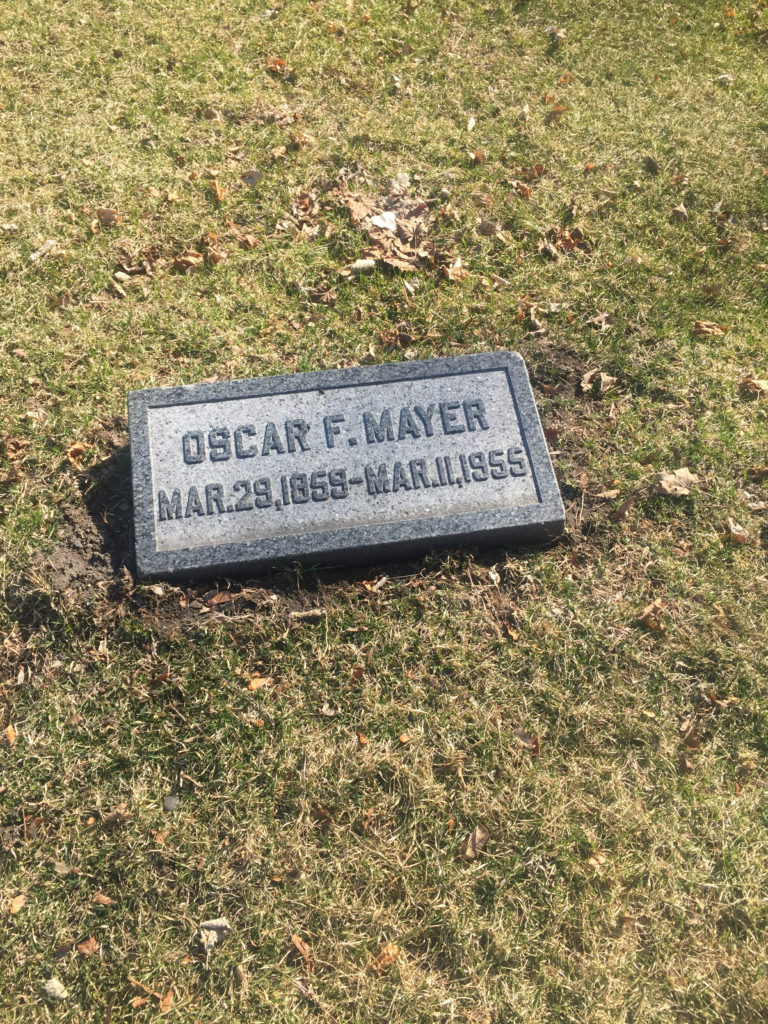Erik Visits an American Grave, Part 840
This is the grave of Oscar Mayer.

Born in 1859 in Kösingen, Kingdom of Württemberg, Mayer’s father was a forester. But his father died in 1870 and his son Oscar moved in with family. He came to the United States in 1873 along with a cousin. They moved to Detroit for a few years and Mayer worked in a meat market. In 1876, they moved to Chicago, which was then becoming a major center for American meat as the railroads brought cattle from the West to be processed in Chicago and then sent across the nation as meat products for the industrializing nation. Mayer got a job at the meatpacking firm of Armour & Company, one of the first large companies to take advantage of this new business opportunity. Mayer wanted a piece of that new meat economy too. In 1880, he suggested to his brother back in what was now Germany that they start a sausage business together. They opened that business in 1883.
Mayer’s business grew rapidly. While not one of the biggest names in the meat industry, he was wealthy enough to be the sponsor of the German Exhibition at the 1893 Chicago World’s Fair. He embraced better sanitation shortly after Upton Sinclair published The Jungle, unlike some other meatpackers who did so only begrudgingly. The company specialized in the pork products that Germans liked, particularly the various German sausages and hams. In 1919, Mayer started opening factories outside of Chicago, specifically in Madison, which would become the center of corporate operations shortly after his death. What made him particularly innovative was brand names on his products. That was not so common on meat during this time. His landlord tried to screw him over by not renewing his lease, hoping to force the profitable Mayer to pay a lot more. Instead, Mayer went independent, built his own building, and then realized he could make more money by giving his products name brands and then sell them on reputation. So in this sense, Mayer played an important role in the development of capitalism in the meat industry.
Like his father, Mayer was very interested in forests and outdoor recreation. He was treasurer of the Forest Preserve District of Cook County, which sought to preserve green space in the city. He also co-founded hunting clubs for elites. During the Great Depression, he was known for giving away sausages to the hungry. All of this is fine of course, but there’s not much evidence to suggest that he was any more pro-worker than any capitalist when it came to his own factory, though he may not have been any worse either. He most certainly was into Fordism and scientific management, so I can’t imagine his workers loved any of that. In 1924, Mayer came up with another innovation–selling bacon in see-through packages.
Mayer continued to keep the company in the family all the way until his death, which was in 1955, at the age of 96. He worked until also the end, or at least showed up to the office, though by this time his son Oscar was running the company.
I am surprised this post is so brief. As it turns out, Mayer is famous today because his name remains on the brand of meat that he founded. I don’t know that at this point anyone would consider Oscar Mayer products among the finest in the processed meat world. To me, it reminds me of the cheap bologna I would have on a sandwich growing up. But hey, how many names remain on products for that long, especially in the world of corporate mergers? In any case, there’s not all that much information easily accessible about Mayer himself.
Oscar Mayer is buried in Rosehill Cemetery, Chicago, Illinois. This was in fact the very last grave I saw before the pandemic forced me to stay at home for two months, on a stressful flight across the country where I had a 5 hour layover in O’Hare the day after all the international travelers were stuck in customs all night. So I got the hell out of there and went to the graveyard. It was weird at the time.
Anyway, if you would like this series to visit other figures in the history of American meat, you can donate to cover the required expenses here. Maurice McDonald, co-founder of the fast food chain, is in Crystal City, California and Frank Perdue, founder of the chicken company, is in Parsonsburg, Maryland. Previous posts in this series are archived here.


